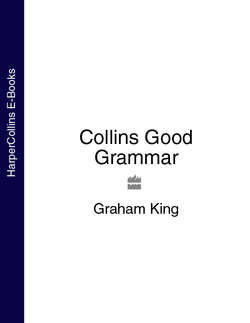Читать книгу Collins Good Grammar - Graham King - Страница 10
Let’s Look at Sentences
ОглавлениеEvery time we speak we use sentences. They are the easiest of all grammatical units to recognise, so it seems sensible to begin with them.
Easy to recognise, yes, but hard to define. In his Dictionary of Modern English Usage, H W Fowler gives ten definitions by various grammarians, including:
A group of words which makes sense.
A word or set of words followed by a pause and revealing an intelligible purpose.
A combination of words that contains at least one subject and one predicate.
A combination of words that completes a thought.
None of these, however, exactly fills the bill, although it is difficult not to agree with the Collins English Dictionary’s definition: ‘A sequence of words capable of standing alone to make an assertion, ask a question, or give a command, usually consisting of a subject and predicate containing a finite verb.’
More important is what sentences are for:
To make statements
To ask questions
To request or demand action
To express emotion
From a practical standpoint, a sentence should express a single idea, or thoughts related to that idea. It should say something. A popular rule of thumb is that a sentence should be complete in thought and complete in construction. And, from a practical point of view, you will soon find that certain rules must be observed if your sentences are to be clear, unambiguous, logical and interesting to the listener or reader.
That said, you still have plenty of scope to fashion sentences of almost any size and shape.
Here is a sentence: the opening sentence of Daniel Defoe’s The Life and Strange and Surprising Adventures of Robinson Crusoe (1719).
I was born in the year 1632, in the city of York, of a good family, though not of that country, my father being a foreigner of Bremen, who settled first at Hull: he got a good estate by merchandise, and leaving off his trade, lived afterward at York, from whence he married my mother, whose relations were named Robinson, a very good family in that country, and from whom I was called Robinson Kreutznoer; but, by the usual corruption of words in England, we are now called, nay, we call ourselves, and write our name Crusoe, and so my companions always call me.
Very few novelists today would have the nerve or the skill to begin a novel with a long sentence like that; for apart from its length it is also a skilfully wrought passage: clear, supple, flowing and ultimately riveting. If it were written today it would most likely appear as a paragraph of several sentences:
I was born in York in 1632, of a good family. My father came from Bremen and first settled at Hull, acquired his estate by trading merchandise, and then moved to York. There he met and married my mother, from a well established family in that county named Robinson. I was consequently named Robinson Kreutznoer, but in time my own name and that of our family was anglicised to Crusoe. That’s what we’re now called, that’s how we write our name, and that’s what my friends have always called me.
Defoe’s original is a fairly long sentence by any standards. Now try this sentence for size:
‘But ––– !’
This one appears to defy everything we think we know about sentences, but it is a valid sentence just the same, as you will see when it is placed in its correct context:
Jane turned abruptly from the window and faced him with blazing eyes.
‘Well, you’ve finally done it! You realise we’re all ruined, don’t you? Don’t you!’
‘But –––!’ Harry was squirming. Speechless. He stepped back in an attempt to evade the next onslaught.
It never came. Instead, weeping uncontrollably, Jane collapsed on to the settee.
You can see that ‘But ––– !’, short though it is, quite adequately expresses a response and an action in the context of the middle paragraph (a paragraph can consist of one or more sentences with a common theme). Despite its seeming incompleteness, it is nevertheless a sentence of a kind, although some grammarians would label it a sentence fragment. Here are some more:
Her expression conveyed everything. Disaster. Ruin. Utter ruin.
Three of the four sentences here are sentence fragments. They’re perfectly legitimate, but use them for emphasis only, and with care.
